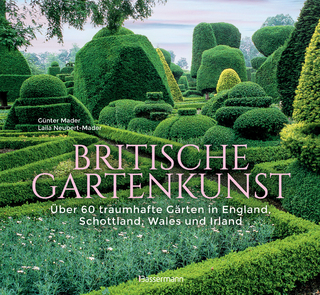
The Japanese Tea Garden
Stone Bridge Press (Verlag)
978-1-61172-015-0 (ISBN)
- Titel z.Zt. nicht lieferbar
- Versandkostenfrei
- Auch auf Rechnung
- Artikel merken
"A necessary addition to the library of any serious student."--The New York Times Sunday Book Review Almost every Japanese garden is influenced by the tea garden. Here, Marc Peter Keane describes the history, design, and aesthetics of tea gardens, from T'ang China to the present day, with over 115 stunning photographs, floor plans, and illustrations. The most extensive book on this genre ever published in English, The Japanese Tea Garden is a rich resource for garden lovers, historians, and landscape architects. Landscape architect Marc Peter Keane lived in Kyoto for twenty years and has a design practice in Ithaca, New York.
Marc Peter Keane, a graduate of Cornell University, is an American landscape architect and author. He lived in Kyoto, Japan, for nearly 20 years, and specializes in Japanese garden design. Presently, he maintains a design office in Ithaca, New York. He is the author of several books about garden design: Japanese Garden Design (an introduction to the culture and design of Japanese gardens); Sakuteiki: Visions of the Japanese Garden (a translation of Japan's oldest gardening text, co-authored with Prof. Jiro Takei), The Art of Setting Stones (a collection of philosophical essays on gardens), and The Japanese Tea Garden (history and aesthetics of Japanese tea gardens). Keane has worked as a lecturer in the Department of Environmental Design at the Kyoto University of Art and Design and at Cornell University, and is a fellow at the Research Center for Japanese Garden Art, Kyoto, Japan, and the Institute for Medieval Japanese Studies, New York. He has lectured widely throughout the United States, England, and Japan. Keane also acted as chairman of Kyoto Mitate International for many years, a non-profit organization that worked to revitalize Kyoto's traditional environments and cultural heritage.
Acknowledgments ii
An Invitation to Tea x
1a brief history of tea 1
Tang-Dynasty China (618–907) 3
Nara-Period Japan (710–84) 4
Song-Dynasty China (960–1279) 5
Kamakura-Period Japan (1185–1333) 9
Yuan-Dynasty China (1271–1368) 12
Ming-Dynasty China (1368–1644) 12
2cultural background 19
Garden History 20
Machiya: Merchant Townhouses 23
The Hermit in the City 27
Tea Aesthetics 39
3muromachi society 43
Bushi: Military Aristocracy 44
Zenso: Buddhist Priests 49
Shonin: Merchants 57
Shokunin/Geinosha: Artisans/Artists 63
4early development of the roji 67
Early Development of the Tea Garden 68
Shuko: The Tea of Urban Merchants in the Late 15th Century 70
Joo: Wabi and Tea in the Early 16th Century 78
Rikyu: The Creation of the Tea Garden During the Late 16th Century 85
5from roji to chaniwa: tea gardens in the edo period 117
The Word Roji 118
Tea Gardens in the Early Edo Period 120
Early 17th Century: Furuta Oribe and the Beginnings of Daimyo-cha 120
Mid-17th Century: Kobori Enshu and the Development of Daimyo-cha 133
Late Edo Period: The Codification of Tea Gardens 139
6extant tea gardens and gardens influenced by tea 57
The Roji of Tea Grand Masters 158
Estate Gardens of Provincial Lords 165
Imperial Gardens 172
Gardens of Merchant Residences 179
20th-Century Private Estates 184
Other Private Residences 189
7parts of a tea garden 197
Outer Gate: Soto-mon or Roji-mon 198
Tea Path: Roji Michi 201
The Waiting Bench: Koshikake 208
The Middle Gate: Chumon 211
The Water Basin: Tsukubai 216
Stone Lanterns: Ishi-doro 224
Dust Pit: Chiri-ana 225
Privy: Setchin 227
Fences: Kakine 227
Walls: Kabe 232
Garden Well: Ido 232
The Plantings: Ueki 233
Notes 243
Tea Text Summaries 261
Glossary of Garden Terminology 268
Bibliography 276
Index 281
| Zusatzinfo | illustrations |
|---|---|
| Verlagsort | Berkeley CA |
| Sprache | englisch |
| Maße | 254 x 203 mm |
| Gewicht | 963 g |
| Themenwelt | Kunst / Musik / Theater ► Kunstgeschichte / Kunststile |
| Sachbuch/Ratgeber ► Natur / Technik ► Garten | |
| Reisen ► Reiseführer ► Asien | |
| Technik ► Architektur | |
| ISBN-10 | 1-61172-015-X / 161172015X |
| ISBN-13 | 978-1-61172-015-0 / 9781611720150 |
| Zustand | Neuware |
| Haben Sie eine Frage zum Produkt? |
aus dem Bereich


